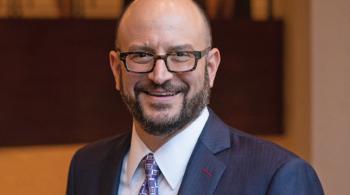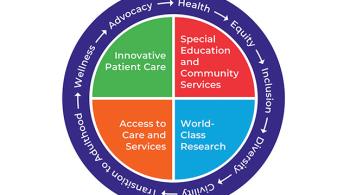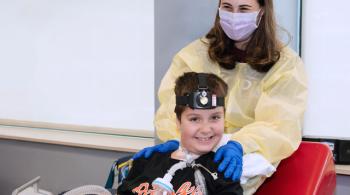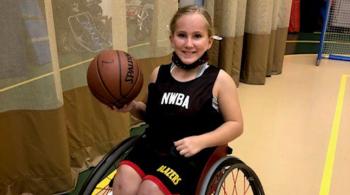Kennedy Krieger has moved quickly to increase its ability to provide telehealth services for its patients, so they may continue to receive the care they need during the COVID-19 crisis.
 To get ready for Journey’s occupational therapy appointment, her parents, Ahsha and James, set up a laptop and yoga mat in Journey’s room. They click on the secure Zoom meeting link they’ve received specifically for the appointment, and voila! They’re connected in real time—via video conferencing—with their daughter’s occupational therapist. The session begins.
To get ready for Journey’s occupational therapy appointment, her parents, Ahsha and James, set up a laptop and yoga mat in Journey’s room. They click on the secure Zoom meeting link they’ve received specifically for the appointment, and voila! They’re connected in real time—via video conferencing—with their daughter’s occupational therapist. The session begins.
In response to the COVID-19 crisis, Kennedy Krieger Institute quickly expanded its telehealth services to allow patients and students, and their families, to continue receiving health services from their Kennedy Krieger doctors, therapists and other providers. It’s a similar experience, providers and families say, to in-person appointments. The Occupational Therapy Department is just one of many Kennedy Krieger departments, programs and clinics using telehealth to continue to provide specialized healthcare services to patients during this unprecedented time.
Journey, 6, started occupational therapy at Kennedy Krieger in 2018. Born extremely prematurely, after only 23 weeks of gestation, Journey has chronic lung disease and, like other patients receiving occupational therapy, needs help developing her fine and oral motor skills, and her ability to do routine activities like dressing herself and brushing her teeth. Since September 2019, she’s missed several therapy sessions due to emergency room visits and hospitalizations for respiratory illness. Journey’s occupational therapist, Lori Tolen, knew the Institute’s launch of expanded telehealth availability would be perfect for Journey, especially with Journey’s history of repeated hospitalizations.
During Journey’s telehealth sessions, “I help her position her arm, or hold her shoulder,” Ahsha says. “It’s a little workout for Mom, too, but that’s okay. My husband and I follow through with whatever Lori is doing, so it gives her an opportunity to say, ‘Try positioning her this way.’ She can actually see how we’re working with her.”
Observing patients via video conferencing has allowed Tolen, the Institute’s assistant director of occupational therapy, to notice details she’s not always able to see. “I can observe more. I can focus on small hand movements that I maybe couldn’t see before,” Tolen says. Previously, parents would tell Tolen about behavioral meltdowns happening at home during therapy exercises, but it wasn’t until Tolen began offering telehealth sessions that she could actually see the meltdowns in progress, and could begin to define the triggers. Telehealth services can illuminate patients’ behavior in their home environment, Tolen explains.
Kennedy Krieger’s occupational therapists are embracing the opportunity to help patients and families with daily routines in real time. Tolen and her colleagues encourage families to use common objects from around their homes during telehealth appointments. Therapy sessions that include developing skills needed to dress oneself can now take place as a patient is actually getting dressed for the day. Zoom’s interactive white board offers additional engaging learning experiences.
Learn More About Telehealth Services
“It is such a privilege to be invited into our patients’ families’ homes,” says Kristin Stubbs, the Institute’s director of occupational therapy. “We’ve never been able to be with the child in their home to see the family rituals surrounding the meal or to see their normal dressing routine, for instance. In the clinic, we had to give them a fake shirt to practice putting on. But they want to practice putting on their Superman shirt and Superman cape, and now they can! We can work on bathing, dressing and other routines while in their home to help problem-solve.”
It’s an exciting challenge to work in the home environment via telehealth. “For children, this is helping to develop purposeful play and their daily living roles,” Stubbs says. “We want each patient to have something meaningful and purposeful in their life. I’m so proud of our department for quickly coming up with a way to continue to provide services in such a hands-on profession.”
Before the COVID-19 pandemic, telehealth services were not generally covered by insurance providers. But many are now covering them. Certainly, a positive outcome from this time of uncertainty is that Kennedy Krieger is paving the way for a hybrid model of care that uses both telehealth and in-person appointments to help patients like Journey receive the best care and treatments possible.
Kennedy Krieger is committed to continuing to provide its patients and students with the very best in care throughout—and beyond—the COVID-19 crisis.















